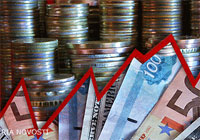Russian manufacturing conditions worsen the most since summer 2009 in January – HSBC

MOSCOW. Feb 3 (Interfax) – Business conditions facing Russian manufacturers continued to worsen at the start of 2014, PMI data from HSBC show.
The overall deterioration in the sector was the most substantial since June 2009, with declines registered for output, new orders, exports, employment and purchasing, HSBC said in a research note.
Meanwhile, inflationary pressures remained historically weak overall, despite the impact of the weaker ruble feeding through to import prices.
The survey’s headline figure is the HSBC Purchasing Managers’ Index(PMI) – a composite indicator designed to give a single-figure snapshot of operating conditions in the manufacturing economy. The PMI registered below the 50.0 no-change threshold for the sixth time in seven months in January, indicating an ongoing downturn in business conditions in the Russian goods-producing sector. Moreover, the PMI declined from 48.8 to 48.0, the lowest reading since June 2009.
New orders continued to decline marginally in January, amid reports of weak underlying demand. The rate of contraction accelerated slightly to the fastest since July 2011, and international demand continued to weigh on total inflows of new work as new export business fell for the fifth month running. The current sequence of declining new export orders is the joint-longest in over four years.
Manufacturing output declined for the second time in seven months in January. The rate of contraction was moderate overall, but nonetheless the strongest registered since May 2009. Although output fell during the month, backlogs of work continued to drop sharply.
Russian goods producers shed staff for the seventh month in a row in January. Employment in the sector has now fallen 14 times in the past 15 months. That said, the rate of decline slowed from December’s 52- month record in the latest period.
Purchasing of new inputs by manufacturers declined at the sharpest pace since May 2009, contributing to the equal-greatest improvement in suppliers’ delivery times in the survey history. Meanwhile, stocks of purchases declined at the fastest rate in over four years.
Average input prices rose in January, partly linked by firms to the weaker ruble. This contributed to higher prices charged for final manufactured goods. Overall, however, inflationary pressures remained relatively weak.
“Manufacturers started the year on a minor note, the January HSBC Russia Manufacturing PMI survey found. Indeed, all key economic activity indicators point to a broad-based contraction. Notably, manufacturing output decreased for the first time since July last year. In conjunction with the reported decline in new orders, ongoing cuts in staffing, faster suppliers’ delivery times and a stronger rise in output prices, the overall picture in manufacturing looks pretty gloomy,” Alexander Morozov, Chief Economist (Russia and CIS) at HSBC, was quoted as saying.
“Importantly, consumer goods producers reported falling output levels for the first time in many months. Apparently, a sharp moderation of demand growth caught them by surprise, forcing them to increase their inventories for now. Intermediate goods producers got some support from growth in export demand that allowed them to increase output amid declining domestic demand,” he said.
“Generalising the January PMI results, we see the Russian economy losing its key driver- private consumption growth. Investment demand has not recovered yet to become a new growth driver, while export demand for intermediate goods is not strong enough to offset weakness in the two other sectors.”
“It follows that surprisingly benign official industrial growth data for December, indeed for 2013 as a whole, will unlikely be sustained in the beginning of 2014. Manufacturers face a serious risk of recession in the coming months, we think. Partial import substitution on the back of a weaker currency and improvement in export demand could mitigate this risk,” Morozov said.”
